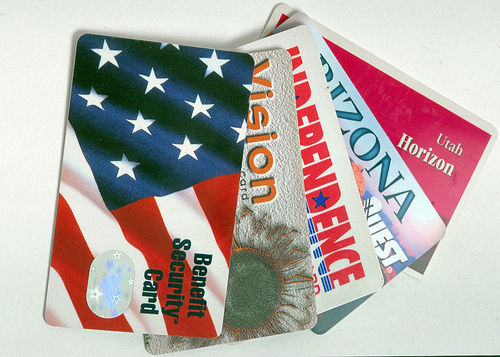 A bill headed for the 2013 Virginia General Assembly will place new restrictions on what welfare benefits can buy, namely alcohol, tobacco and porn.
A bill headed for the 2013 Virginia General Assembly will place new restrictions on what welfare benefits can buy, namely alcohol, tobacco and porn.
Virginia is looking to regulate purchases made with Temporary Assistance for Needy Families (TANF) benefits, more commonly known as Welfare, by possibly tracking them on EBT cards. (Photo by USDA)
Delegate Riley Ingram, R-Chesterfield, said HB 1307 was inspired by the story of a store clerk in New Hampshire who was fired for not selling cigarettes to a person trying to pay with their TANF benefits.
“I started checking and found out there are no restrictions on that at all. All I am doing is stopping some of it, OK,” he said. “I don’t want them using my tax dollars to go to Paper Moon (strip club) and things like that.”
The issue is not unique to Virginia. According a report from the Electronic Funds Transfer Association, a collaborative group of banks, credit card companies, government agencies and others, nine states have some restrictions on the books controlling what TANF benefits can buy.
TANF is managed by the federal government through the Department of Health and Human Services, but TANF funding is administered by the states through block grants. TANF funds often are distributed through Electronic Benefit Transfer (EBT) cards, which act like debit cards for beneficiaries.
On the federal level, Section 4004 of the Middle Class Tax Relief and Job Creation Act of 2012, which passed in February, prohibits using EBT cards to buy alcohol or for gambling or adult entertainment.
But while the federal law is on the books, it is not expected to be fully implemented until 2014.
One problem is that not all welfare benefits are credited to easily traceable EBT cards. In Virginia, recipients can have benefits deposited directly into their checking accounts, or they can get an old-fashion paper check. Prepaid debit cards, called EPPICARD, are also available. Once those funds are converted into cash, transactions are not traceable.
“The color of the money is always the same whether it’s TANF or money from earnings,” said Tom Steinhauser, director of Benefit Services at Virginia’s Department of Social Services, which administers the state’s TANF funds.
A General Accounability Office report from July 20 found that while six of 10 states surveyed had restrictions in place, they still faced challenges “in identifying inappropriate locations and preventing transactions at these locations .”
The GAO then used fiscal year 2010 EBT transaction data from California, Florida, New York and Texas, which don’t have restrictions, to see if inappropriate purchases could be tracked. It found the data was “generally incomplete or unreliable, and was of limited use to the states for systematically identifying or monitoring inappropriate locations.”
Steinhauser said the department is looking at what other states are doing to monitor electronic purchases ahead of the federal implementation of the law.
“We could technically hold retailers responsible for ensuring the transaction isn’t purchased using an EPPICARD,” he said. “But that card looks like pretty much any MasterCard you would get, so that becomes difficult.”
Virginia’s Supplemental Nutrition Assistance Program (SNAP), commonly known as the food stamp program, already has similar restrictions in place and uses EBT cards to ensure enforcement, but Steinhauser said switching over TANF to a similar system would not be without significant costs.
“We spend about $3.5 million for our EBT system each year,” he said. “I assume we would have a similar expense for (TANF).”
Steinhauser said the average montly TANF allotment per family in Virginia is about $258.
“It’s a pretty limited amount of cash they have, so if they are using it for purchasing cigarettes and things, then they really don’t have enough (for) what’s needed for rent and utilities.”
HB 1307 has been referred to the House Committee on Health, Welfare and Institutions and will be on the docket by Jan. 9, when the General Assembly convenes.
Ingram said he expects a measure of resistance when the bill comes up for discussion.
“Every time when we try to pass something that is a common sense proposal, we do hear from way over from the far left side that we are picking on the poor people,” he said. “This is not picking on the poor people, because this is just a common sense measure.”
Contact Carten Cordell at [email protected]

